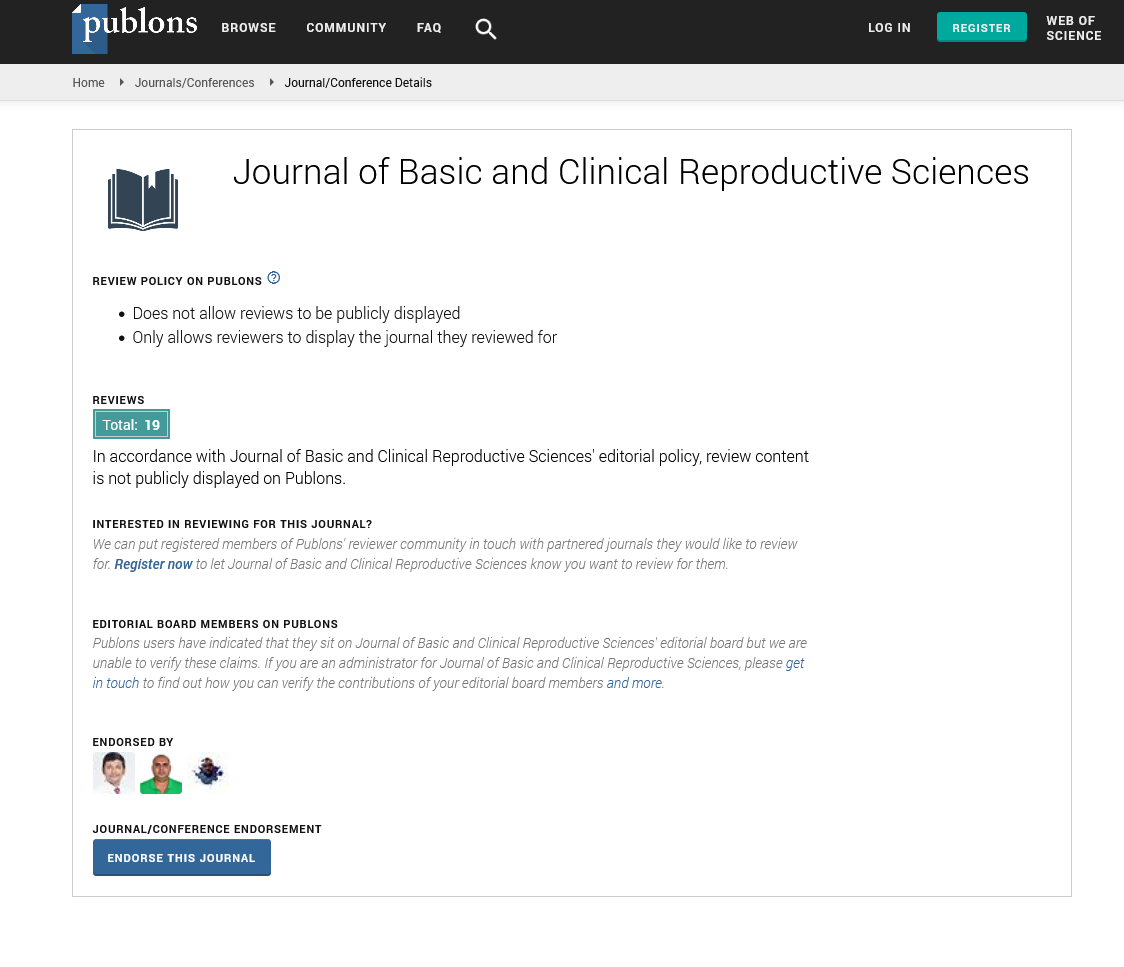Opinion - Journal of Basic and Clinical Reproductive Sciences (2023) Volume 12, Issue 4
Complexities of Reproductive System Cancers in Women from Diagnosis to Survivorship
Received: 31-Jul-2023, Manuscript No. JBCRS-23-114417; Editor assigned: 02-Aug-2023, Pre QC No. JBCRS-23-114417 (PQ); Reviewed: 16-Aug-2023 QC No. JBCRS-23-114417; Revised: 23-Aug-2023, Manuscript No. JBCRS-23-114417 (R); Published: 30-Aug-2023
This open-access article is distributed under the terms of the Creative Commons Attribution Non-Commercial License (CC BY-NC) (http://creativecommons.org/licenses/by-nc/4.0/), which permits reuse, distribution and reproduction of the article, provided that the original work is properly cited and the reuse is restricted to noncommercial purposes. For commercial reuse, contact reprints@pulsus.com
Description
Reproductive oncology is a critical field of medicine that deals with cancers affecting the female reproductive system. The female reproductive system is a complex and intricately designed network of organs, tissues, and structures responsible for the formation, transport, and nurturing of a fertilized egg and the development of a new life. This system plays a pivotal role in the continuation of the human species. The ovaries are central to the female reproductive system. The female reproductive system is a marvel of biological engineering, with each component performing a specific role to ensure the survival of the species. Understanding its anatomy is fundamental not only for reproductive health but also for the broader understanding of human biology and life itself. The diagnosis and treatment of gynaecological cancers present unique challenges due to their location and potential impact on fertility. Reproductive oncology is a specialized branch of oncology dedicated to the diagnosis, treatment, and management of cancers that affect the female reproductive organs. The female reproductive system includes the cervix, uterus, ovaries, fallopian tubes, vulva, and vagina, and each of these structures can be susceptible to cancerous growths. Gynaecological cancers encompass a diverse group of malignancies, each with its unique characteristics and challenges. One of the most common gynaecological cancers, often linked to Human Papilloma Virus (HPV) infection is Cervical Cancer. Early detection through pap smears and HPV vaccination is crucial for prevention. Ovarian Cancer is also known as the “silent killer” due to its lack of early symptoms, ovarian cancer poses significant diagnostic challenges. Genetic counselling and testing play a vital role in high-risk cases. Uterine Cancer is typically diagnosed in postmenopausal women and associated with hormonal imbalances. Obesity is a significant risk factor. Vulvar and Vaginal Cancers are rare but serious, these cancers require multidisciplinary care for accurate diagnosis and treatment.
Diagnosis and treatment
Regular Pap smears and HPV testing are critical for the early detection of cervical cancer. Ultrasounds, MRIs, and CT scans are used to diagnose ovarian, uterine, and vulvar/vaginal cancers.
Tissue samples obtained through biopsies are essential for confirming cancer diagnoses. Surgical intervention is often the primary treatment for gynaecological cancers, involving the removal of tumours and affected organs. Chemotherapy is commonly used to treat ovarian, cervical, and uterine cancers and may be administered before or after surgery. Radiation therapy may be utilized in cases where cancer has not spread beyond the pelvis. Targeted drugs designed to inhibit specific molecules involved in cancer growth are used in select cases.
Fertility preservation
For many women diagnosed with gynecological cancers, the potential loss of fertility is a significant concern. Several fertility preservation options are available. Choice of fertility preservation method depends on individual circumstances, such as age, gender, medical condition, and treatment plan. Oocyte cryopreservation allows women to freeze their eggs before cancer treatment. Fertilized eggs can be frozen and stored for future use. Egg freezing is commonly recommended for women who need to undergo medical treatments like chemotherapy or radiation that may damage their ovarian function. In some cases, ovarian tissue can be removed, frozen, and later reimplanted. Temporary suppression of the menstrual cycle using medications may be an option to protect fertility during treatment.
Conclusion
Reproductive oncology plays a crucial role in the early detection, treatment, and management of gynecological cancers. A cancer diagnosis has profound emotional and psychological effects. Patients must grapple with uncertainty, fear, and potential changes in body image and self-esteem. Access to counselling and support groups is vital to address these psychosocial aspects of cancer care. With ongoing research and advances in diagnostic and therapeutic techniques, there is hope for improved outcomes and a higher quality of life for patients. It is imperative that healthcare providers and researchers continue to work together to address the unique challenges posed by gynecological cancers and to provide comprehensive care that encompasses both medical and psychosocial aspects.


